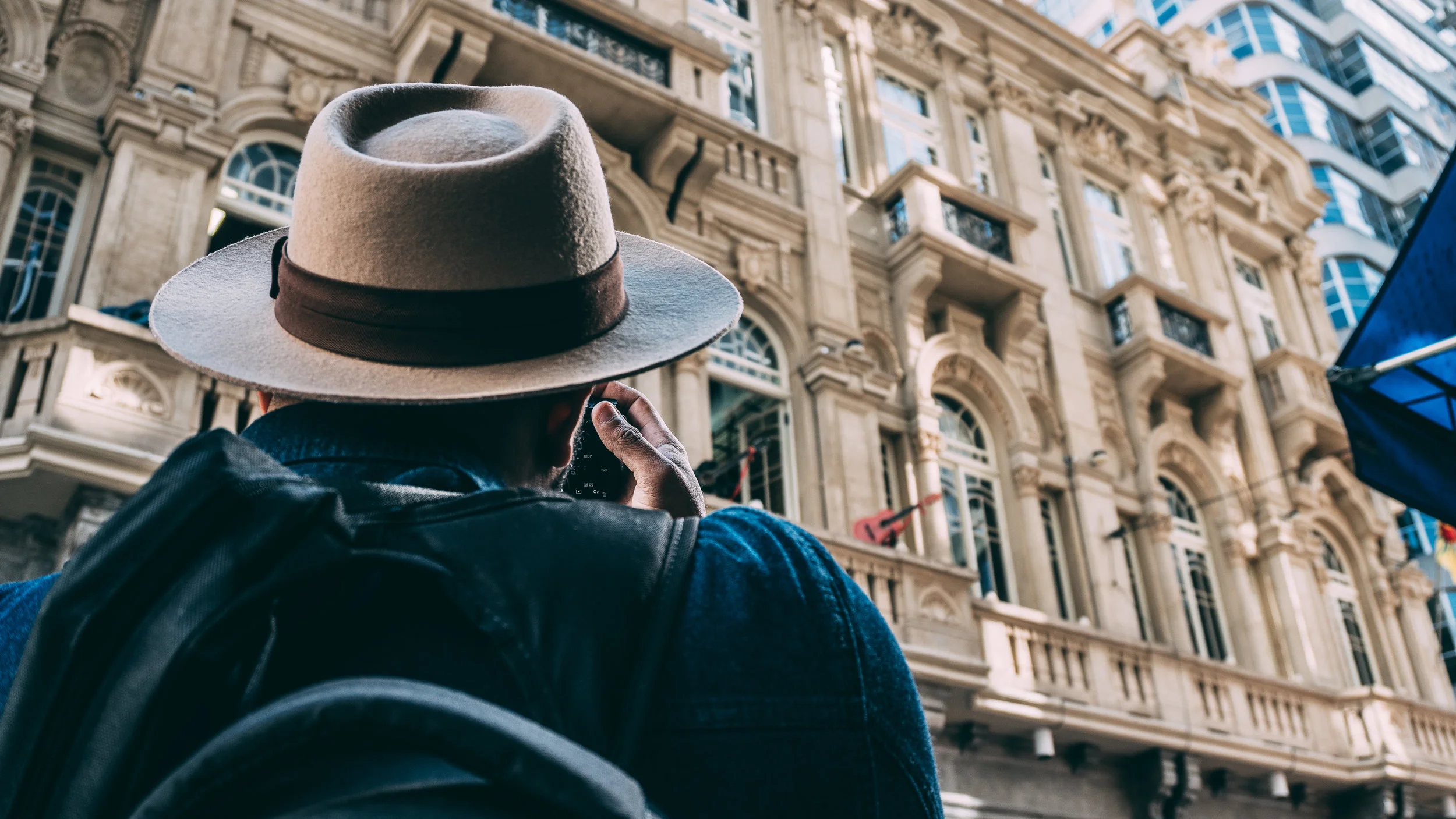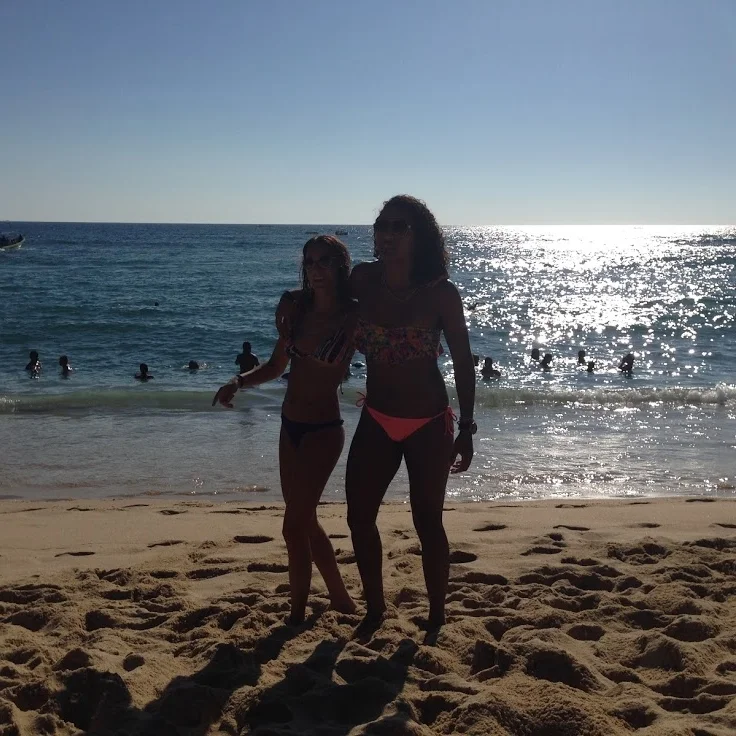Alright, so you’ve just planned your next trip, holiday, vacation, jaunt, etc. Call it whatever you want. You’re going somewhere and you should be excited! But, you may also be a bit nervous. You may be heading to a far-flung corner of the world that has picturesque, postcard-worthy views and vistas, but you’re not sure of how it will all actually be once you get there. You’ve consulted dozens of guides, articles (sort of like this one) and you want that little extra bit of confidence to push you over the edge. I get it. I’ve been there. In fact, I’ve been there so many times that I want to share a few of my own hard learned pieces of advice to make you feel a bit more prepared for your next journey. A quick guide on how to get your footing in any new country, if you will.
Find a Friend in Any New Country
The number one piece of advice I have for you, whether you’re going on a couples vacation, solo adventure, group trip, etc. is to find a friend who’s local to your destination.
With the rise of the Internet and travel communities, finding a credible, trustworthy friend is possible in almost any country. You could also say that the rise of the Internet has made scammers, creeps and unsavory souls more prevalent, which is true. But, there are ways to get around this. The main reasons for finding a friend are:
To learn the customs of the culture quicker (it’ll help to avoid any faux pas)
Avoid any common scams that may not be all that common to you e.g. bracelet and gold ring scams in Paris, manila folder scam in Kenya, missing tourist office scam in India, etc.
Find the best (and cheapest) places to eat at an affordable price
Share a bit of your own culture with someone who probably wants to learn about your country and lifestyle
Me and a good friend of mine, Caro, who was an enormous help in teaching me the ways of the Costa Rican people
A few ways to find a friend:
Social media - put out a blast across your social networks asking friends if they know anyone in the country you’re going to. You may be surprised to find that a friend of a friend’s cousin lives in the country you’re going to and has friends in the exact city you’re traveling to. It’s not uncommon, at all. And, finding friends through your own network will help to ensure that you’re meeting with trustworthy people (safety is crucial, of course)
Travel groups / forums - there are loads of legitimate travel groups and forums out there today. Many of these travel groups are on Facebook (e.g. a great one for PoC travelers Nomadness Travel Tribe) and have members who are expats in the country you may be traveling to. In terms of forums, Lonely Planet and TripAdvisor have great communities where you can meet travelers going to your destination, and where you can view their profiles to make sure they’re real people.
Couchsurfing - If you know me, then you know that this is, by far, my favorite option for all things related to finding friends in new countries. I’ve met dozens of people via Couchsurfing, have crashed on over a dozen couches around the world (India, Ireland, Indonesia, Nepal, Costa Rica, Guatemala and more) and have hosted a bunch of people when I lived in NYC. It’s phenomenal. But, know that it’s a community, not just a free place to find a couch to crash. Many people I’ve met and explored with never even hosted me. There are groups for countries and cities, where people are constantly posting excursions they want on, or different parties / coffee dates they’re hosting. What’s best is that you can vet the hell out of people! Every profile comes with an About section, as well as a place for photos and references (the references are most important).
A screenshot of the “Travel Companions” group on Couchsurfing - look at all of those adventures!
Get Lost in Any New Country
Get lost!
Yes, you read correctly. Getting lost is one of the best ways to know a city. Give yourself a few hours (preferably in the morning / afternoon, so it’s not dark out) to wander around and soak it all up. This may sound contradictory to tip #1, but it’s not. I Couchsurf often, but always make a point of breaking away from my new friend and spending a morning or two wandering around the area, learning new street names and seeing where places are in relation to main sites / monuments.
The last bit is extremely helpful. If you give yourself a list of monuments (think of it like a scavenger hunt) to find, you’ll be able to retrace your steps and see how all of the monuments are connected to one another in a city. No Google Maps, Waze, physical maps or anything else. Just you, your new country and the locals. This will help you to create a mental map and make you that more knowledgeable about where you are.
Traveling on foot is always best for this, since places look a lot different from a taxi, train or even on a bicycle / scooter, but it’s also important for you to learn the main modes of transportation. For example, when I arrived in Quepos, Costa Rica, I spent the night (I said to do this during the day, but…) walking from my apartment to the main town. The walk took about 30 minutes, but it made me that more confident in doing it the next day, when it was light out. Afterwards, I learned that I could take a pirata (pirate taxi) for $1.
I got lost in Bali and found myself in the most amazing set of rice terraces I’ve ever seen.
Learn Some of the Language in Any New Country
Even for those who feel like they can barely speak their own language, learning ten to twenty words in a new language isn’t all that hard. Of course, this depends on the language. Some are harder than others, but, again, the Internet (and guidebooks, when necessary) has made this easier than ever.
Now, the best way to do this is by speaking with your new friend, which you should already have. But, if not, you can easily draft up a list of common phrases and ask a member of the hotel staff, a waiter or waitress at the first restaurant you dine at or even some friendly-looking madam or gentlemen (do this in daytime, please) in a public place to translate for you (provided that they speak English or your own language).
The second best way to do this is my typical go-to: Google Translate. Google Translate, of course, doesn’t have every language in the world. But, it has many of them. And, what’s even better is that if the language you’re looking to become familiar with doesn’t have the script you’re used to e.g. English to Chinese, Italian to Arabic, etc., you can click the little speaker button and have it pronounce it for you. As you can see in the example below, Google Translate will also provide a somewhat phonetic pronunciation for the world you’re translating. Note: I noticed that Google Translate doesn’t have the little speaker button for languages using an Arabic script e.g. Arabic, Persian, Urdu. In that case, I suggest you do a quick Google search and see what you find.
A screenshot of Google Translate showing you the speaker button and phonetic spelling on the right side.
The most important and hardest thing to do, in order to make sure you gain a good grasp on the ten to twenty words you aim to learn, is to practice. This is the most important because you want to make sure people actually understand you. And this is the hardest because you need to muster up the required confidence to just go for it. My advice, don’t think about people laughing at you, giving you quizzical stares or even scoffing at your lame attempt to learn their language. Instead, think about how much of an effort you’re making in another person’s land opposed to perpetuating the (typically dumb) traveler stereotype.
You won’t be sorry! I’ve learned a handful of phrases in a variety of really obscure languages, and I can’t tell you how many times they’ve helped me make new friends in the most “random” places e.g. knowing how to say “How are you?” and “Hello!” in Kazakh helped me make a new friend in Bali.
My younger brother and me making new friends in Peru - looks like a family photo.
Learn Currency Conversion Rates in Any New Country
This is an important one for a handful of reasons:
Avoid people who may want to scam you - Unfortunately, some people are out to scam travelers. And one way is by giving you the incorrect amount of change or by quoting exorbitant amounts for things that are otherwise cheap. The best way to combat this is by knowing the conversion rate from your own currency to the country you’re in. Learning how to count to ten or at least the words for 1, 5, 10, 20, 50 and 100 is also helpful.
To not overspend - Some countries have really beautiful and colorful money e.g. the Euro, Indian Rupee, etc. The only problem with colorful currency is that it can feel, and look like, monopoly money. It’s not. But, you may feel like Daddy Warbucks and want to spend your money any and everywhere you go, which will make it burn faster than you actually think it is.
To plan ahead - Whenever I go to a new country, I always take money out of ATMs in the airport. This is because it makes more sense for me to take money out of an ATM opposed to exchanging my money (dollars) at a currency exchange, where they often charge a commission on top of normal fees. Knowing a new country’s currency allows me to know how much to take out of the ATM (I typically budget for a week at a time), and be prepared to only spend that (and not more) until I need to take out money again.
The best way of learning the currency, is by memorizing the conversion rate from 1 unit of your own currency to the new currency you’ll be using for the duration of your trip. If your currency is weaker than the new country’s currency, do it backwards. For example, If you’re from Uganda and you’re going to the States, it’s better to memorize how much $1 is to the Ugandan shilling ($1 = USh 3,629.43) opposed to converting 1USh into $1.
Once you’ve mastered 1 unit, memorize 5, 10, 20, 50 and 100. Having these markers will help with quick conversions in taxis, markets, restaurants and anywhere else you may go.
Feel any more confident? Maybe a little bit? Good. The tips I’ve listed above are nowhere near comprehensive, but they’re the ones I use every time I travel regardless of where I’m traveling to. If you have any of your own, which I’m sure you do, please leave them below in the comments for other readers to see – don’t be stingy!
Originally featured on SwagPapi: How To Get Your Footing In Any New Country
Mateo Askaripour
Mateo is a writer who quit his flashy job in NYC to live life on his own terms. He’s done everything from working at an orphanage in Nairobi to building a new university in Abu Dhabi to sleeping on volcanos in Guatemala. And right now, he’s working to get his novel published. His writing has been featured internationally in publications including Matador Network, GoAbroad, Víkurfréttir, Caribbean News Now and Black & Abroad. Regardless of where he is, he’s always working. To keep up with him, follow him on Instagram & Twitter at @AskMateo and read one of his elaborate stories at SwagPapi.com















